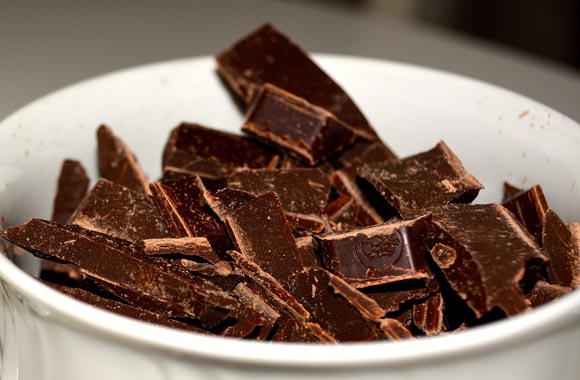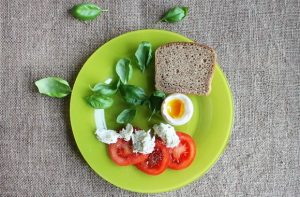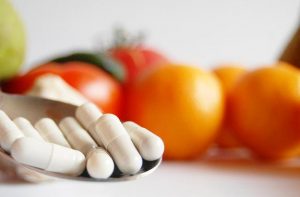Mood Food
It’s not clandestine that there are complex links between our physical well-being and the food we eat. However, growing research has also associated the dots between intellectual health and the diversity of nutrients and vitamins. Though food on its own cannot improve problems related to our brain such as depression, and stress a diet rich in mood-enhancing foods can offer a nice balance to medication or/and conventional psychotherapy.
Raw Chocolate
When you are feeling low, accept it or not, eating raw chocolate will perk up your mind and you will start feeling better. The reason behind this is the presence of important chemicals such as anandamide and phenylethylamine. These are known to provide a feel-good effect. Also, phenylethylamine is known as a love chemical. These enhance your mood and you can eat raw chocolate without any adverse outcomes from the chemicals it possesses as both anandamide and phenylethylamine are free of any kind of negative side effects.
Salmon
Salmon is chuck enriched with Omega-3 fatty acid, which is considered to be a heart-healthy fat that supports mood as well as memory. While in our brain Omega-3 fatty acids are present in much abundance even more than in any other body part. Various studies have proved its effectiveness for our brain. It helps to alleviate mild forms of depression, lift mood and enhance the production of important hormones. Owing to hormonal imbalances, a person may suffer from aggressive behavior, which is usually linked with depression and anxiety. Salmon is also rich in vitamin B12, which is believed to boost serotonin production. The serotonin in the brain neurotransmitters is accountable for mood.
Eggs
An egg encloses innumerable nutrients to aid in body and mind health maintenance. It’s also high in protein content which helps in slowing down the absorption of the carbohydrates in the blood, thus keeping you full in the stomach. This unhurried absorption will also facilitate feeling vigilant and productive all day long. The egg yolk, usually needlessly avoided for its elevated cholesterol content, is a rich source of vitamin D, vitamin B12, and also choline, which all help to boost memory. Vitamins D and vitamin B12 both enhance the levels of serotonin in the brain.
Bananas
Banana is loaded with magnesium, which diminishes anxiety and improves our sleep. Soothing and stress-lowering, bananas also possess tryptophan, which is an amino acid that is transformed into serotonin in our body. These are also a rich source of different nutrients, and thus they help to deliver a good quantity of oxygen to the brain; these are healthful and vitalizing snacks.
Turkey
Turkey also encloses tryptophan, mood-regulating chemicals. It also consists of proteins that especially help in relaxing the brain. It is also rich in melatonin which is known to relax the body as a whole. Turkey is also a good source of another amino acid tyrosine which boosts energy levels and assists the body to deal with stress. Tyrosine perks up dopamine and norepinephrine levels thus helping in improving your mood.
Walnuts
Walnuts are rich in omega-3 fatty acids, magnesium, and serotonin. It also acts as an antioxidant-rich nut. It has been found that due to a deficiency of magnesium a person is likely to suffer from depression, irritability, insomnia, and anxiety. Walnuts improve this deficiency and help to stabilize mood by keeping blood sugar levels at a normal level and by lessening mood swings.

Things You Can Do To Improve Your Mood
No doubt many problems affect our mood. We sometimes become sad, angry, or offended. Likewise, some people even undergo extreme moods as seen in the case of anxiety and depression. Though antidepressants are there to help them these are not without side effects. If you look around, you will find various ways to be happy. There are many natural strategies present that help you to come out of the depressive and gloomy feelings. These can even save you from the use of medicines.
Here we have presented 10 ways you can do to improve your mood. We are sure; they will lighten your worries and boost your mood.
Do Shallow Breathing
It was found to affect your mood. If you do not take deep breaths, you may likely lead to poor oxygen delivery to your body tissues. So, check out this energizing exercise that will calm your aggressive mood.
Take a breath into your body via the nose slowly and allow your chest to expand fully. Hold it and count. Now take the breath out slowly and again count. Counting should be double on each breath intake and out. Repeat a similar procedure at least 10 times and you will feel better.
Check Out your Old Photos
This is one of the easiest ways to change your mood. Go through the photo album of your baby, any visitor any event that gives you ecstasy. It will probably make you feel good.
Listen to Some Music
Various studies have proved that listening to music can help us in several ways. It lowers BP, lessens our stress, and enhances our mood. You can listen to any type of music, you like the most. It will work!
Exercise
Indulge yourself in any sort of exercise you like to do or you normally do. It is said that exercise helps in releasing the endorphins that facilitate making our mood pleased and satisfied.
Smell A Lovely Fragrance
Studies show that smelling a pleasant fragrance has good effects on the endocrine system, circulatory and nervous systems. Even one study has shown that smelling lavender oil before undergoing dental work can make you experience less nervousness.
Indulge Yourself Into Spiritual Side
Indulging yourself in your religious services can also give your mind a calming and relaxing feeling. The more frequently you attend these services, the more satisfied you will feel. You can try restoration yoga or meditation. A new investigation shows that holy practices, for example, regular mindfulness exercises, can, modify the anatomy of the brain in a way that endorses a sense of happiness or well-being.
Try to Help Someone
Try to help your friends or colleagues with their work. It will make you feel good and forget your worries. Those people who help others are the most contented.
Come Out of Your Past
If you have some grimy or unpleasant memories just escape from them as they will only make you feel restless regarding your future. Come out of the depression you suffered in the past and trust in God for your future and betterment.
Talk With Your Friends
Ask your friends to either come to your home or meet you at some hotel or any recreational sport. Talk to them and dine with them. You will feel fresh and happy.
Play with a Pet or Babies
You can play with your babies and it will help you to forget your worries. In case you don’t have babies then play with your pet. An important point is to make yourself busy with any interesting activity.

Boost “Feel Good” Neurons with Amino Acid Brain Supplements
What would you say if I would tell you that your happiness is right there in your brain…but you can’t feel it because of all the other bad feelings your brain is fighting with all the time? You may be happy at this very moment but your brain refuses to see this, only because of its poor health condition. The “feel-good” neurons inside your brain do not function as they should because they are not fed properly with the right substances. Feeding your brain with amino acid supplements can boost your feel-good neurons that are responsible for your happiness and feeling-good sensation. The amino acid brain supplements can be the answer and the solution to one of the biggest questions of all times “What is happiness?”.
Did you ever ask yourself how does your brain works?
There are a lot of highly specific and complex functions we do all the time during the day. Every second your brain does a lot of complicated processes. From the start of your day, your brain gives you orders to open your eyes, arise from your bed, have your breakfast, go to work, finish your daily duties, how to move and receive the information, organize it, save it, and recall it when you need, there are millions of orders registered in your brain. The great job of the brain is that it can recall the suitable order for the situation you are facing without you even feeling it. Even when you are sleeping your brain works. Your brain arranges, processes, corrects, and translates a lot of information per second. It works in a way much faster than you can imagine.
You are probably asking how this small part of our body can process this huge amount of information.
How can the brain receive, process, correct, and recall information? Simply, your brains consist of billions of cells which are called nerve cells. Nerve cells are modified cells that have axons. These axons end on the effector organs, like the eyes, ears, etc. You can open, close, and move your eyes in different directions only because the brain is connected to them. Through your ears, you receive the sounds like waves and the brain is decrypting them so you can understand them. Your brain is the master controller of your body.
How does your brain give orders to the other organs?
The nerve impulses transmitted along the axons arise from the nerve cells, when they move along the axons they jump from one point to another which what called nodes of Ranvier. The axons are surrounded by the myelin sheath, and the speed of impulse transmission and ability to nerve regenerate depends on the myelin sheath.
In which form are the impulses transmitted?
The transmission of impulses occurs via what are called neurotransmitters. Neurotransmitters are chemical substances that arise from nerve cells. There are many types of them. Their synthesis occurs by many substances like lipids, amino acids, carbohydrates, vitamins, and minerals.
How does the neurotransmitter do its action?
Neurons use two types of communication, local and long-distance. The impulse enters the cell body through nerve fibers called dendrites. Then the impulse travels away from the cell body through the axon.
There are vesicles at the end of axons that contain neurotransmitters. There are also what are called receptors these receptors are situated on the cell membrane, in the cytoplasm, and in the nucleus of the dendrites, axons, and the effector’s cell, where the neurotransmitters attach to these receptors and cause rapid electrolytes to exchange to occur.
Do you know that there is a relationship between your brain and what you eat?
As we mentioned previously the nerve cells, myelin sheaths, neurotransmitters, and electrolytes are so important in the integrity of your brain function. Their synthesis and supply are from the dietary intake.
How can your diet activate your brain?
At first, our brain is a vital organ that needs oxygen so factors which help in the integrity of red blood cells, and hemoglobin are very important as sources of iron “Fe” Vitamins such as “E, B12, B complex, folic acids,” are very important. So we should search for a diet rich in them.
Also, glucose is of great value for brain function so should source supply us with our glucose needs.
Electrolytes, which play an important role in the processes of exchange between the neurons, there increase or decrease make neurological manifestations. We should keep adequate supplements in our diet.
Most neurotransmitters are made from amino acids. We get the amino acids from protein digestion. There are essential amino acids and non-essential amino acids our body can’t synthesize these essential amino acids, so our diet must contain these essential amino acids. A complete protein contains all the essential amino acids, such as fish and meat, fowl and eggs, and cheese. Other incomplete proteins, do not contain all the essential amino acids such as grains and legumes, seeds and nuts, and leafy green vegetables, so complementary proteins is to have different incomplete proteins to obtain all necessary amino acids. So, vegetarians, people can depend on vegetables without meat.
Carbohydrates cause Relaxation.
Glucose causes your body to secrete insulin. Which drives amino acids inside the cells for storage except for tryptophan. It keeps circulating and becomes predominantly available to your neurons, which use it to make the serotonin that makes you feel relaxed.
Vitamin C and B5 are needed for your brain to synthesize acetylcholine.
DMAE (dimethylaminoethanol) is a natural substance found mostly in various fish such as sardines. DMAE increases levels of choline in the brain.
GABA is the primary inhibitory neurotransmitter. It’s an amino acid made from glutamic acid. It promotes muscle relaxation and also prevents anxiety.
Taurine is an amino acid neurotransmitter that stabilizes neuron membranes. It also has antioxidant properties.
The “feel-good” neurons can be stimulated by all the things we mentioned, and the good thing is that we can provide all this to our brain not only from foods but from natural supplements too, that contain important amino acids, vitamins, minerals, and proteins.
Either way, if we choose to feed our brain with regular healthy food or nutritional supplements, we should consult from time to time with a health nutritionist who can tell us which diet is the best for us.

Feel Good Neurotransmitters
Feeling good is a factor that results when the brain gets the right instructions from the chemicals produced within our body and that interact with one another. Everyone wants to be happy but if the brain does not allow it, one cannot feel happiness. How the brain controls our moods is an interesting thing. There are five major chemicals involved in this process of mood controlling present in our brain emotion centers namely, Serotonin, dopamine, GABA, opioids, and norepinephrine.
Every deed of us, every thinking and feeling, and every emotion either good or bad that we, as human beings experience needs the interaction of these main five feel-good neurotransmitters.
These neurotransmitters act on different receptors in the brain and produce the feelings we experienced. Now we discuss them separately.
Serotonin
Serotonin is a neurotransmitter important to the maintenance of a good mood. It is synthesized from tryptophan within our body in the presence of adequate vitamins B1, B3, B6, and folic acid.
Its function is to carry messages between nerve fibers. It is linked with melatonin and cortisol which regulate the emotional well-being of a person. Serotonin regulates our sleep, inhibits the pain pathway, and gives us a sense of accomplishment.
The best food sources of tryptophan include milk, whey protein powder, turkey, brown rice, cottage cheese, meat, peanuts, and sesame seeds.
Low serotonin levels produce insomnia and depression, anxiety, aggressive behavior, low libido, and increased pain sensitivity.
Gamma-aminobutyric acid (GABA)
It is present in the wide areas of the central nervous system, and functions as an anti-depressant, and anti-anxiety, also inhibiting pain pathways and reducing panic attacks, making the person calm, quiet, controlling, and focus things. It also increases growth hormones and is popular among bodybuilders. It is synthesized from glutamate in the brain and acts as an inhibitory neurotransmitter.
Opioids
Opioids are famous for their addiction since they can be easily obtained by the incision of unripe capsules of the white poppy, Papaver somniferum, a plant. Its action is characterized by excitement and narcosis. It acts on the central nervous system by its receptor mainly endorphin and produces feelings of well-being and laughter. It is one of the natural painkillers.
Norepinephrine & Dopamine
Dopamine consists of five receptors D1, D2, D3, D4, and D5 via which it acts. In the brain, it is present in the substantia nigra and ventral tegmental area. It is the precursor of epinephrine and norepinephrine. It performs vital functions in the brain e.g. behavioral and cognitive functions, sense of reward, euphoric feelings, stimulatory functions, and voluntary movements, also control sleep, moods, appetite, memory, and learning abilities. It inhibits prolactin. Low level leads to a well-known disease called Parkinsonism.
Norepinephrine is also a well-known feel-good neurotransmitter and is the primary excitatory neurotransmitter needed for motivation, alertness, and concentration, as well as for mood improvement. It is important for new memories and to transfer them to long-term memories. Norepinephrine affects the rate of metabolism. Dopamine is important for fine muscle coordination. It’s also easily oxidized; therefore adequate intakes of vitamins C and E are necessary to protect dopaminergic neurons from free radical destruction.
Norepinephrine acts as a hormone as well as a neurotransmitter. It is manufactured from dopamine in the presence of the enzyme dopamine beta-hydroxylase. When acts as a hormone, it is released from the medulla of the kidney and then acts as a transmitter it is released from the nervous system.
Norepinephrine’s major role is in the attention and focus of a person. It controls appetite, produces sexual arousal and energy, motivates the person, and makes him feel happy. Its low levels lead to depression and anxiety. Since its synthesis depends on the availability of tyrosine which is present in meat, nuts dairy products, and eggs so we can enhance our levels by utilization of these foods!
Because of the number of different stressful conditions, we have to face daily and because of the world we live in, a normal diet should supply enough of the raw materials, that the brain needs to synthesize enough of these neurotransmitters so that we feel good and handle every kind of situations properly!
Your neurons manufacture both Norepinephrine and Dopamine neurotransmitters from the amino acids tyrosine or phenylalanine in the presence of adequate oxygen, vitamins B3, B6, and C, folic acid, iron, and copper. Sources of tyrosine include almonds, avocados, bananas, dairy products, lima beans, pumpkin seeds, and sesame seeds.
Acetylcholine
Acetylcholine is the primary chemical carrier of thought and memory, this excitatory neurotransmitter is essential for the storage and recall of memory, concentration, and focus. It also plays a significant role in muscular coordination.
Unlike other key neurotransmitters, acetylcholine is not made from amino acids. Its synthesis depends on the recycling of its choline form. It is found in lecithin as phosphatidylcholine. Foods high in lecithin include egg yolks, wheat germ, soybeans, organ meats, and whole wheat products.




